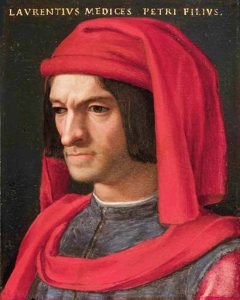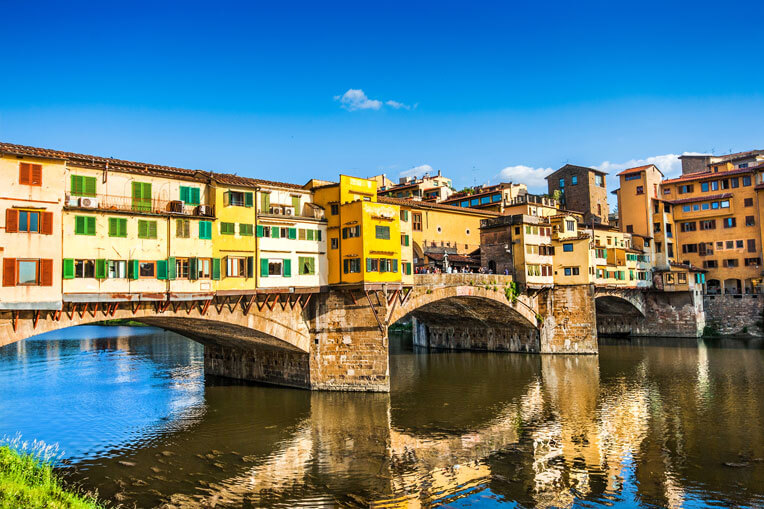“Quant’è bella giovinezza, che si fugge tuttavia! / Chi vuol esser lieto, sia / di doman non c’è certezza.”
Tomorrow has no certainty, so dance and sing and love today. This is the message Lorenzo de Medici delivers in his Triumph of Bacchus, written in 1490. Even today, the poetic lyrics of his “canto carnascialesco,” or carnival song, powerfully reverberate from the streets of Medieval Florence, where they were first inked on paper.
So who was Lorenzo de Medici and what are the “canti carnascialeschi”? Lorenzo was born in 1449 and was the son of Pietro de Medici. After the sudden death of his father, he assumed the role of leader of the republic of Florence at the young age of twenty. Undeniably a brilliant man of many talents, Lorenzo was a banker, merchant, politician, poet, philosopher, patron of the arts, and lover of music. It is no wonder his name has notably gone down in history as “Lorenzo il Magnifico.”

Perhaps what is most honorable about this man is that he had the ability to navigate his way through an aristocratic-bourgeois society, while maintaining a rare sensibility for the popular class. He enjoyed writing and conversing in the plain, vernacular humor of the masses, but could also lead dignified discussions on the highest, most cultivated forms of art and music.
Prior to Lorenzo’s involvement, Florence’s Carnevale festivities consisted of “traditional jousts and parades” that, according to Patrick Macey, retired Professor of Musicology at the University of Rochester’s Eastman School of Music, “testified to patrician power in Florence.” In his book titled Bonfires Songs: Savonarola’s Musical Legacy, Macey writes that Lorenzo “Promoted a new kind of celebration that emphasized the donning of masks, so that the idle ‘giovani’ (youths in their twenties, whose age rendered them ineligible to hold public office) could mimic the artisan class and in the process inject a more ‘popular’ flavor into carnival.”
In his lifetime, Lorenzo wrote eleven “canti carnascialeschi,” or carnival songs. On the surface, the first songs seemed to innocently poke fun at various professions, such as bakers selling cialdoni (a type of pastry). A closer look at them, however, reveals a wily side to Lorenzo’s personality. The texts are cunningly laced with obscene sexual innuendos and hidden double meanings. Youths would dress up in masks mimicking the various professions the songs described. Taking advantage of their disguise, they would emphasize the erotic acts the texts implied without embarrassment. Florence’s Carnevale celebrations were coated with these playful connotations until 1478 when, as a result of a Pazzi scheme, Lorenzo was badly injured and his brother, Giuliano, killed. Following the incident, festivities were suspended for ten years.
Perhaps due to his deteriorating health and the effects of his gout, he could sense his imminent death. When the celebrations resumed in 1488, Lorenzo wrote songs that were no longer filled with the lewd language of his earlier works. These new songs held profound philosophical truths that continue to resonate even today.
His Triumph of Bacchus is the most beautiful and famous of his carnival songs. The poetic text features Bacchus the Roman god of wine, revels, and joy, and his wife Ariadne, daughter of Minos, King of Crete. As the story goes, after helping her lover Theseus defeat the Minotaur and escape from the Labyrinth of Crete, Ariadne was abandoned by him on the island of Naxos, where she was later rescued and comforted by the god Bacchus. During Carnevale, the song of the Triumph of Bacchus rang jubilantly through the streets. Accompanied by a lively brigade of singers and dancers (representing nymphs), these mythological figures rode through the crowds on elaborately decorated carri, or floats.
In his poem Lorenzo writes of joy, the ecstasy of love, and the bountiful pleasures of youth. He celebrates life and happiness. His words are intoxicating, and yet the bliss is accompanied by a bitter, melancholy truth: our youth is temporary. Time, and life is fleeting. Death is inevitable, and tomorrow is not promised. His words encourage young men and women to rejoice in their lives and the beauty of their youth without limitation, before it is too late.
Though he couldn’t have known it at the time, the text is also a foreshadowing of the grim future of the republic of Florence. Under Lorenzo’s rule art, music, and literature thrived beautifully, but almost immediately after his death in 1492, the austere Dominican priest Girolamo Savonarola rose to power. Several of Lorenzo’s songs and melodies were mercilessly destroyed in the Bonfire of the Vanities in 1497, when Savonarola ordered the burning of all precious books, artworks, musical instruments, and other objects that were thought to be immorally excessive.
Quant’è bella giovinezza,
che si fugge tuttavia!
chi vuol esser lieto, sia:
di doman non c’è certezza.
Quest’è Bacco ed Arïanna,
belli, e l’un dell’altro ardenti:
perché ‘l tempo fugge e inganna,
sempre insieme stan contenti.
Queste ninfe ed altre genti
sono allegre tuttavia.
Chi vuol esser lieto, sia:
di doman non c’è certezza.
Questi lieti satiretti,
delle ninfe innamorati,
per caverne e per boschetti
han lor posto cento agguati;
or da Bacco riscaldati
ballon, salton tuttavia.
Chi vuol esser lieto, sia
di doman non c’è certezza.
Queste ninfe anche hanno caro
da lor essere ingannate:
non può fare a Amor riparo,
se non gente rozze e ingrate:
ora insieme mescolate
suonon, canton tuttavia.
Chi vuol esser lieto, sia:
di doman non c’è certezza.
Questa soma, che vien drieto
sopra l’asino, è Sileno:
così vecchio è ebbro e lieto,
già di carne e d’anni pieno;
se non può star ritto,
almeno
ride e gode tuttavia.
Chi vuol esser lieto, sia:
di doman non c’è certezza.
Mida vien drieto a costoro:
ciò che tocca oro diventa.
E che giova aver tesoro,
s’altri poi non si contenta?
Che dolcezza vuoi che senta
chi ha sete tuttavia?
Chi vuol esser lieto, sia:
di doman non c’è certezza.
Ciascun apra ben gli orecchi,
di doman nessun si paschi;
oggi siam, giovani e vecchi,
lieti ognun, femmine e maschi;
ogni tristo pensier caschi:
facciam festa tuttavia.
Chi vuol esser lieto, sia:
di doman non c’è certezza.
Donne e giovinetti amanti,
viva Bacco e viva Amore!
Ciascun suoni, balli e canti!
Arda di dolcezza il core!
Non fatica, non dolore!
Ciò c’ha a esser, convien sia.
Chi vuol esser lieto, sia:
di doman non c’è certezza.




























